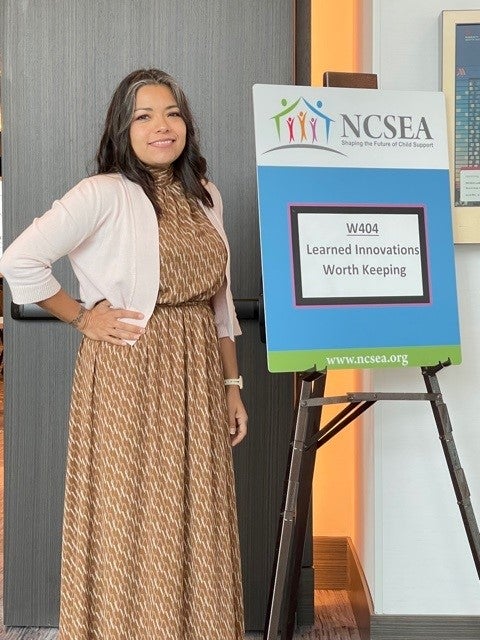
MSSW alum Noelita Lugo believes in empowering people to take active part in exploring solutions to community or organizational problems. After 19 years working at the Texas Attorney General office, Lugo has recently shifted into a new role in private consulting, combining some of the consulting and social work skills she developed during her time as a graduate student to find creative solutions with clients.
As Programs Practice Director at Public Knowledge, Lugo works at the intersection of supporting practices and policies. Her work includes identifying evidence-based programs, interventions, or research that could inform public policy or shift the way an organization approaches their public service. In a current project, Lugo is supporting a state in pursuing a federal grant, pulling techniques from the nonprofit sector for engaging with funders and philanthropists, strengthening stakeholder connection, and ensuring a sustainable funding plan.
“What I really enjoy about my path, both academically and professionally, is being able to not only make the connection between different types of work, but also connections between research-backed methodologies,” Lugo said.
For example, Lugo explains, motivational interviewing is a method often used within social work and counseling fields. However, she has found that it can be transferred to other fields to help stakeholders feel included in the process and have a say in the solution. This is both a method she uses as a consultant and one she recommends to clients who are trying to provide better services for their stakeholders.
“Sometimes when we’re in a public service position, we’re inclined to solve problems for people, but that’s not our role,” said Lugo. “Really it’s honoring people’s autonomy and spotlighting options but not going in and thinking we can solve other people’s problems for them.”

A good consultant, she believes, will always retain a sense of curiosity to understand the client’s challenge from their perspective, acknowledging the complex political and external factors that may be contributing to a problem.
Lugo gained some of her first consulting experience while a graduate student taking courses through the Nonprofit Studies portfolio, especially in Nonprofit Strategy and Entrepreneurship, taught by Dr. Deborah Edward. She recommends students to take experiential learning courses that provide a “safe training ground” to work on real projects with nonprofits to both develop skills and help determine if nonprofit or consulting work is a career path of interest.
“A fun thing about the portfolio program is being exposed to those opportunities where we can provide services, to go in and work with a nonprofit,” she said. “Especially if you haven’t had as much professional work experience, being able to articulate that you have that capacity to be curious, to solve problems, to take the initiative, and to take calculated risks - a lot of times that’s what senior management is looking for.”
Lugo completed the Nonprofit Studies portfolio program while a graduate student at the Steve Hicks School of Social Work on the Community Administrative Leadership (now Administration and Policy Practice) track. The portfolio, she said, was a good opportunity to get involved in coursework related to her interest in public policy, nonprofit leadership, and fiscal management.
“It was really valuable to be around other graduate students who are just as passionate about solving public policy issues, and they’re coming at it from a different academic perspective,” said Lugo.
Years down the road, her connection with the LBJ School helped connect her to serving on the board of the Texas Network of Youth Services (TNOYS). At the time, the executive director of TNOYS was Christine Gendron, an LBJ School alum and former classmate of Lugo’s. Lugo had previously worked with TNOYS in her position with the Texas Attorney General and learned about the opportunity to serve on the board, where she has served for three years as executive board secretary. Her volunteer board service has exposed her to the different roles one can play in social change – the activist, the advocate, and the disruptor.
An activist, Lugo explains, is an individual or coalition outside of an organization attempting to change a system or public policy; an advocate is someone who works closely with the system or the organizations itself; within an organization, there can be either disruptors or sustainers of the system.
“I’ve learned things I can do that can be effective in terms of communication and messaging,” said Lugo. “How we frame problems really influences how we then isolate solutions, and it’s so fascinating to see how an activist might frame a problem versus an advocate.
“Ultimately, if you’re working with a sustainer or disruptor, how do they then present the issue to their higher-ups and whoever their stakeholders are – whether it’s voters, executive officers, the governor, or whoever,” she continues.
Lugo describes the challenges that a disruptor trying to change an organization from within might face, especially when the public might see you as a “cheerleader” for a system you are attempting to change.
“How do you walk that line between wanting to advocate and representing your organization in a positive light when you know there are so many things that need to change?” Lugo said.
Over time, Lugo has learned the value of acknowledging publicly when mistakes have been made and respecting peoples’ experiences, even if the system only failed one person. She believes it’s important for organizations to turn inward when this happens and examine their practices, policies, and training to find a systemic solution to the problem.
“At a certain age you get worn down by the same barriers and the same bureaucratic nonsense and the same systemic issues, and you either remain stubborn, like me, or you're like, ‘Well, what can I do?’” Lugo said.
“My hope is that we can have more people realize that, truly, nothing is going to change unless each subsequent group of people picks up the baton and keeps pushing and pushing.”

